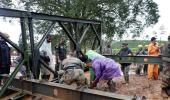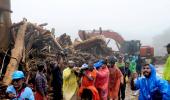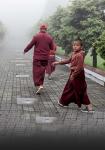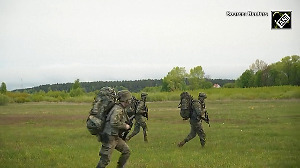IAF pilots and crew dodged low hanging clouds, mist covered hills, steep valleys and landed on broken landing grounds to rescue civilians in Wayanad.
In one mission, they had to descend vertically to get close to the survivors.
IAF crews flew over 80 missions, saving lives and giving hope. This is how they did it.

In every national calamity, be it landslides, floods or a deluge -- the country has always had one reliable saviour:
The IAF helicopter.
Flown by skilled military pilots and crew under extremely dangerous conditions, through narrow valleys and ravaging waters, it has saved lives when all hope is lost.
In the past month itself in Uttarakhand, Himachal, Arunachal and Kerala, IAF pilots and crew have operated in treacherous locations, dodging low hanging clouds, mist covered hills and landed on broken landing grounds to rescue civilians.
The largest humanitarian assistance and disaster relief conducted this year was in Wayanad, Kerala, where nearly 400 people died after multiple landslides struck within four hours on July 30.
The tragedy hit at 2:17 am. The IAF's nodal regional HQ in Trivandrum received the requisition for assistance to rescue survivors from the state government in the early hours of the morning.
By first light, two helicopters took off from the Sulur air base near Coimbatore which was closest to the disaster location.
The flying time to the location was about 35 minutes, but the weather on that day -- in fact for the next three days -- was extremely bad. It was raining continuously, and the approach to the location was through a narrow valley covered in thick clouds.
Great flying skills were required to reach the location which was situated inside a bowl surrounded by hills.

As they flew in, pilots and crew were taken aback by the extent of the destruction below. Stranded people could be seen on either side of the river through the entire stretch of the path of the landslide.
It was the first time that a bird's eye view of what had actually happened could be communicated to rescue agencies on the ground.
The damage was so severe that there were hardly any landing spots for helicopters to touch down. The first landing was carried out over a broken road patch.
"There was an element of doubt if the road would hold when the chopper landed, but the crew did it, and we evacuated people with very serious injuries," says Group Captain Shyam, the coordinator of the mission.
Most of the people that were rescued had critical injuries. Two of the survivors had broken ribs, another had a broken leg. They were secured on stretchers and carried onboard.
Due to unavailability of suitable places, the helicopters had to resort to very low hover over slushy ground to perform rescue and supply drop missions.
"In one sortie, when one of our crew went down to coordinate with the ground party, he sank knee-deep into the earth because the mud was slushy."
"The helicopter was hovering low and he had to be pulled back into the aircraft," Group Captain Shyam tells Rediff.com's Archana Masih in in a telephone conversation.

On most missions, the crew had to negotiate combinations of poor visibility, low clouds and narrow valleys.
In one mission to rescue survivors stranded in the middle of a fast flowing river located deep inside a valley, the crew had to establish a very high hover and then descend vertically to get close to the survivors.
"They picked them up and once again vertically climbed up and took off. It was raining and mist picked up from the fast flow of the river which made it very challenging," says the officer.
"This needed tremendous skill and confidence."

All of the crew assigned to the mission had flood relief experience. Many had previously been part of Operation Karuna in the 2018 Kerala floods.
But the operation in Wayanad was different that in addition to search and rescue, the crew had additional roles of inserting search troops in the morning and extracting them in the afternoon so that they could reach areas which otherwise would have been near impossible to reach on foot.
"There were days when we dropped three search parties at different locations. Helicopters saved time because we could drop them at a given location in 30, 35 minutes," explains Group Captain Shyam.
In the first three days, the aim was to save as many lives as possible.
When it became known that chances of finding survivors was grim, sorties were conducted to airlift the mortal remains of the victims.
The mortal remains were placed inside body bags by search parties and pulled up into the helicopter by a bucket winch -- which resembled a metal cradle.
The remains were handed over to the state administration on a landing ground in Sulthan Bathery.

The IAF flew 80 plus missions from Kozhikode and Sulur; it continues to be on standby.
It rescued 12 critical people and retrieved 10 body bags.
"The weather was the most challenging part in this mission. However, it is a combination of technology, well-oiled machinery between the civil agencies and IAF, and institutional memory of the lessons learnt from past operations that helps us in missions like these," says Group Captain Shyam.
"Also, it gives the crew tremendous gratification that they could make a difference."
The people of Kerala would vouch for that.
WATCH: In a daring rescue, an IAF helicopter pulls people from a rapidly flowing river
WATCH: An IAF Mi-17 helicopter lands on precarious landing ground to rescue stranded people
Videos edited by Rajesh Karkera/Rediff.com
Feature Presentation: Aslam Hunani/Rediff.com











